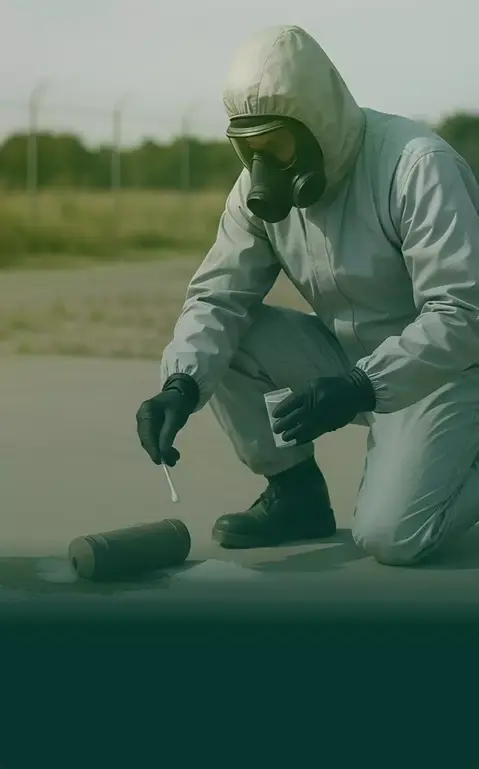

SCIENTIFICALLY DEVELOPED
Hazardous Chemical Detoxification
Our research-driven innovations protect people from the world’s most dangerous chemical threats.

Selected Live Agent Test Results
HD (Sulfur Mustard)
--%
GB (Sarin)
--%
VX
--%
A230
--%
99% destruction threshold
DETOXIFICATION SYSTEM
Spill-CAT
Our next-generation dry powder formulations absorb and detoxify highly toxic liquids, including CWAs.
They have been independently tested by government laboratories against live chemical agents.
We publish our data openly — explore the full results from independent, live-agent testing.
We publish our data openly — explore the full results from independent, live-agent testing.
Protecting People Wherever Chemical Threats Arise
From bulk agent destruction to legacy munition clean-ups and rapid surface decontamination, Spill-CAT provides a single, proven solution across defence, industry, and emergency response.
Safe, Simple, Proven Detoxification
Every element of Spill-CAT is engineered for real-world conditions - balancing performance, safety, and simplicity in the field.
Scientifically Proven
Independently validated against live agents in real-world conditions.
Field-Portable
Lightweight and efficient - just 2kg of Spill-CAT neutralises 1kg of agent.
Inherently Stable
Inert and temperature-resilient, making it safe to store and transport anywhere.
Safe to Handle
Formulated without corrosive components or heavy metals for operator safety.
Ready to Use
Deploy directly in the field - no mixing, added water, or solvents required.
Easy Disposal
Tenfold less waste, to incinerate or dispose through Hazmat waste streams.
Flexible Delivery Formats for Demanding Missions
From rapid-response bags to large-capacity drums, Spill-CAT offers scalable delivery formats for every operational scenario.

Custom Delivery Systems
Our engineering teams can design custom systems tailored to your equipment, extraction platforms, or deployment method.

RESEARCH-LED
Experts in Chemical Detoxification
With decades of experience in chemical defence and CWA detoxification, our team turns proven research into practical, field-ready solutions.
Through effective, affordable, and user-friendly systems, we help ensure hazardous chemical risks are reduced and responsibly eliminated.



















